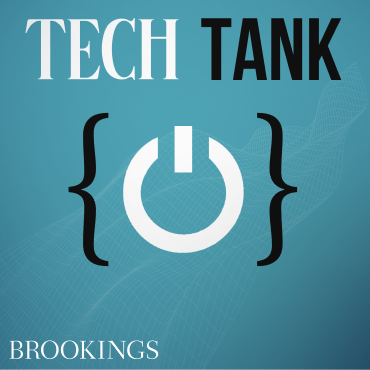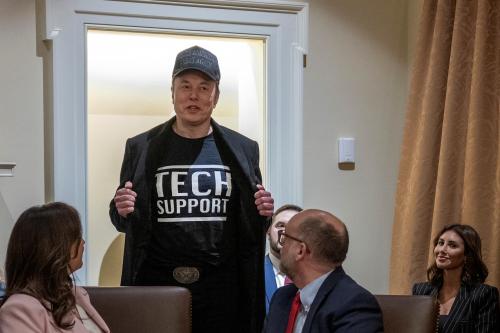TechTank, a biweekly podcast from the Center for Technology Innovation at Brookings, explores today’s most consequential technology issues. Moderators Nicol Turner Lee and Darrell West speak with experts and policymakers to share data, ideas, and policy solutions that address the challenges of our digital world.
Some leaders in the Trump administration are adopting an “AI-first strategy,” as it seeks to both remove “burdensome requirements” for developers and “accelerate” artificial intelligence’s (AI) use within the federal government. Staff members associated with the Department of Government Efficiency (DOGE) are reportedly using AI to analyze agency operations, surveil communications, and probe an agency’s programs to aid Elon Musk’s goal of cutting $1 trillion from the federal budget. DOGE operatives have gained extraordinary access to government databases and downloaded some of the material to unauthorized file servers throughout this process. In addition, DOGE and Musk have led efforts to consolidate agencies’ data, further raising concern and risks in terms of privacy, security, and algorithm development.
In this episode of the TechTank Podcast, co-host Darrell West speaks with Allison Stanger, Distinguished Endowed Professor at Middlebury College, about how DOGE is using AI in the federal government and the risks of its extensive access to government information.
Listen to the episode and subscribe to the TechTank Podcast on Apple, Spotify, or Acast.
Transcript
CO-HOST NICOL TURNER LEE [00:00:00] You’re listening to Tech Tank, a bi-weekly podcast from the Brookings Institution, exploring the most consequential technology issues of our time. From racial bias and algorithms to the future of work, Tech Tank takes big ideas and makes them accessible.
CO-HOST DARRELL WEST [00:00:28] Thanks for joining our Brookings Tech Tank podcast. I’m Darrell West, senior fellow in the Center for Technology Innovation at the Brookings Institution. In the Trump administration, staff members with the Department of Government Efficiency are using AI to analyze agency operations and communications and identify possible targets for cost-cutting. In the process of analyzing government activities, DOGE operatives have gained extraordinary access to government databases. And, according to media reports, have downloaded some of the material to its own file servers. This has raised risks in terms of privacy, security, and algorithm development. To discuss these issues, I am pleased to be joined by professor Allison Stanger. She is the Distinguished Endowed Professor at Middlebury College. She has written about how government data gives private companies extraordinary access to confidential information. Offers unusual opportunities to develop new algorithms. We will discuss how DOGE is using AI in government and the risks presented by its access to government information. Allison, welcome to our Brookings Tech Tank podcast.
GUEST ALLISON STANGER [00:01:40] Great to be here, Darrell.
CO-HOST DARRELL WEST [00:01:42] Well, it’s nice to be with you. And I know a couple of weeks ago, you published an article on the conversation entitled “DOGE Threat: How Government Data Would Give an AI Company Extraordinary Power.” A really wonderful piece, definitely recommended to our listeners. And in that piece, you argue that DOGE has gained extraordinary access to government information and that there are considerable risks associated with that access. So let’s start with the first part of that argument. What kind of access have DOGE staff members actually gained to government data?
GUEST ALLISON STANGER [00:02:17] Well, we have, the interesting thing here is we have a variety of reports from the media about what systems have actually been breached. The part that intrigued me at first was the idea that even if you had only read access to data, you can still be downloading it and using it for other purposes. So, I’m a long time student of the U.S. government. I’m very familiar with the data systems that are in place for understanding where your taxpayer money is going. And part of what drew me to this issue was this sense that something wasn’t quite right with the DOGE. Wall of receipts in that most of the information that’s being posted there is from publicly available sources. There are a lot of publicly available sources of government data as well as the stuff that the government wants to keep private. And so I thought it’s super interesting that they were circumventing the inspectors generals which exist to point out where government can improve itself. And they have indeed pointed out in multiple instances things that DOGE thinks it’s discovered. But they were they were insisting that their presence was necessary and I just didn’t think that revealing waste, fraud, and abuse was the whole story. So I started digging around a bit and discovered a number of interesting things which I wrote about in that piece. What your listeners should know about me is I wrote a book called One Nation Under Contract, The Outsourcing of American Power, and that got me just deeply into government databases that are publicly available because I was trying to track how over time the percentage of the U.S. government spending that was going out the door on contracts and grants was increasing exponentially. Yet the number of federal employees was staying roughly constant over time since the 60s. So that’s, again, counting full-time government employees. What those figures represent is that the bulk of government spending, which is big, the critics are right to point out it’s big, is primarily going out the door to the private sector or the nongovernmental sector. And it was that discrepancy that led me to write that book, to find out what some of the implications of that increasing privatization meant for our democracy. And what I found basically is a trend long in motion to privatize the US government. And in some ways we can see the DOGE maneuver with Donald Trump. As part of a long-standing trend that’s finally in full culmination where you have almost a hostile takeover of the U.S. government by DOGE. And we don’t know exactly why they want all this access to data. We do know that there are a number of reasons to suspect that the data is very useful Two Musk companies. Also to Donald Trump. It’s a nice alliance of convenience there, but a number of things we kind of packed there But that’s just giving you a kind of a big picture view of how I got interested in this in the first place And that work has enabled me to see things that just don’t quite add up and then I then I dig into them Try to figure out what’s true. What’s really going on to the best of my ability. That’s what I try to do in that piece
CO-HOST DARRELL WEST [00:05:48] I think those are all great points. And I think you’re right about the outsourcing and how fundamentally that has reshaped public operations over several decades now. And on this data piece, I think your right to be very interested in the data access. So when you started to look at this, what kind of data have DOGE staff members actually gained access to?
GUEST ALLISON STANGER [00:06:12] Well, that’s the thing that’s so odd is, you know, this data is largely coming from the Federal Procurement Data System, which is the database that feeds into USAspending.gov. USAspend.gov is actually a creation of then, well, it was spearheaded by then Senator Barack Obama. And the idea was that through the Federal Financial Transparency and Accountability Act. You would have a website for the public that would show Americans where their tax dollars were going. And it really was quite a rich resource, lots of things wrong with it, as we all know about government data systems. They’re not state-of-the-art like the private sector might have. But you really could learn a lot from those publicly available sources. That’s what’s interesting is the things that DOGE was posting, and indeed some of the big mistakes they made, were very much based on publicly available sources. You can replicate that in the publicly available resources. So this idea that they’re discovering something that no one’s noticed before is suspicious. From the get-go. They made a lot of mistakes because the Federal Procurement Data System that feeds into usaspending.gov, that cool website that Americans can use to see where their tax dollars are going, that’s a live stream. So if you want to, say, drill down on a particular contract, you can do it. And you can see, wow, $400 million just went out the door to this particular organization. And look! There are no receipts in the system. Wow, what’s going on? That money must have been graphed, siphoned off. It isn’t the case. It’s just that like when you file an expense report, First, there’s the amount of money in the budget that you’re allowed to spend, and then you send the receipts in after the activity’s been incurred. And that’s true of the US government as well. Money can be targeted for particular activities that take place over time. So you might go into the system and see this really suspicious contract. Gee, they haven’t reconciled their accounts for that one. And then four weeks later, you could go in and look at the exact same contract, and it just reconciles clean and beautifully. And many of the mistakes they made that New York Times has chronicled so nicely are a result of just not. Paying attention to the way the system works, which is understandable because it took me a long time to figure out how it works. It’s not exactly totally user-friendly, these publicly available sources. So that’s what they encounter, just like any of us would encounter if we looked at it. The thing that seems to be different though and that’s the thing I’m watching closely is they seem to have seized control of payments, the payment systems and that is the thing that has people really concerned. Because you may not realize that it’s super, super inefficient in some ways, you know they’re right to say our government is inefficient but what I like to say in response to that is that. In a sense, the way we treat data in the US government mirrors the separation of powers in our political institutions. And that’s super, super inefficient, but guess what? It’s also democratic because no one has complete control of the information of the US government. And that is the thing that would be enormously valuable to any AI company is to have access to real-time government data. That’s what people are doing. And spending in real time not what we’re projecting they might spend or deducing from their social media activity. So that’s very, very valuable data on how the economy actually operates. And if it’s centralized in the hands of one company or a close alliance of companies, it’s going to give them a head and shoulders advantage above their competitors. So, I’m sure rival AI companies to X, XAI, Elon Musk’s company. Are watching this with great interest and concern.
CO-HOST DARRELL WEST [00:10:36] I think that is a great point about some of the unusual aspects of government data and just how beneficial they are in kind of the richness of the material that is in there. I know in the conversation article that we mentioned earlier, you talked a little bit about some the unusual benefits that government data could offer to a private company. And you just mentioned it’s real-time data, so obviously that’s valuable. It’s longitudinal information, so it covers information over a period of time. And then you also noted the data is often linked to processes and outcomes. And so it’s not just like somebody reports doing something, but then you can see the consequences of what they did, which is an amazing feature of some of these data sets. So could you talk a little bit about that?
GUEST ALLISON STANGER [00:11:22] Sure, yeah. Elon Musk himself has said that the AI development to date has already exhausted all the available sources that are publicly available. That’s quite a statement. So they’re talking about having to use synthetic data to continue to train these models. Well, someone who had access to the US real-time government data in some kind of systematic whole of government way, would have data that nobody else had. And that is very much, and it’s clean data in the sense that it is based on real activities, as you point out, rather than the prediction of what outcomes might be. And they can be tracked over time. You could track a person’s financial. Information through IRS tax returns over the course of their entire lifetime, and perhaps deduce something interesting about that individual’s impact on the economy, but it would also mean you have access to all this private information that the U.S. Government guards with great attention. There are so many levels of clearances that are in place to prevent all the data being in one individual’s hands. It might seem to the outside observer that, say, the firing of the NSA chief is unrelated to these DOGE enterprises. I’m not convinced that it is unrelated. The NSA has extraordinary access to data, global data about activities around the world. They have very strict guidelines in place for being able to access the government of U.S. Citizens, but they, as they like to say at the NSA, the Fourth Amendment does not apply to foreigners. And so as I watch the stuff going on with ICE, I have taken note that all the people to date that have been denied due process are not U. S. Citizens. The NSA would have information on them. That’s not a coincidence. That’s part of a systematic effort to gain control over all the information the US government has and centralize it in the hands of Donald Trump and Elon Musk. And you don’t have to have opinions about the intentions of either to realize that that is an extraordinary amount of power to have. It’s an extraordinary amount of power to have for individuals that have vested interests in some of the ongoing ongoing operations. So it really is this immense thicket of conflicts of interest that are wholly unprecedented in U.S. Governmental history. So there’s a lot to disentangle there. But… It’s definitely the case that any data that they would gain access to is useful for them in their economic ventures. But it’s also useful for the politically. They can target their enemies more effectively with data. So it’s not an accident, for example, that the Germans are the most sensitive about centralizing data in one place. And that’s because in their history, they’ve experienced the consequences of that. And we in the United States have no comparable experience. So we allow that to happen without thinking it’s a big deal, but it’s super, super big deal.
CO-HOST DARRELL WEST [00:15:24] So you mentioned some of these privacy and security considerations associated with government data. What are the risks of private companies having access to the kinds of government data that we’re talking about? You mentioned privacy intrusions, there’s security risks, conflicts of interest in private companies, having this information, being able to target enemies in a very precise sort of way. How could this information be misused?
GUEST ALLISON STANGER [00:15:51] It could be dramatically misused. I mean, the American people have in a sense trusted, well, they used to trust private companies to take care of their personal information. They’ve since seen all the ways that for-profit companies have exploited that information and used it to profit enormously. In exchange, we get all sorts of wonderful benefits. But when you look at the case of Edward Snowden, there was a whole debate about where data should be housed. And many people trusted, they did polling, many people trust private companies more than the US government, which I think is an enormous mistake. Because I wrote another book called Whistleblowers that for which I interviewed most of the prominent national security whistleblowers, but also the senior leadership of the NSA at the time of the Snowden breach. And the thing you realize, you go in there with all these preconceptions about what the U.S. Government is like and what the NSA is doing, and a lot of people think the NSA is just stealing the data of U. S. Citizens, but when you go there, it’s quite because they’re enormously patriotic people. And they have a whole code of conduct as to how they handle data that is very much constitution front and center. You know, your right to privacy as a U.S. Citizen cannot be violated. You’re not a U S citizen. That’s another matter entirely. But they religiously respect the rights of U. S. Citizens. And I think what we’re seeing in this globalized world of tech companies that really are sovereign entities onto themselves. We’re seeing the envelope being pushed. Who actually has the rights guaranteed in the US Constitution? Who has First Amendment rights, for example? Is it just US citizens, or is it everybody in the United States? These are things we’ve never really debated publicly. And I think they’re becoming enormously important for understanding what’s going on.
CO-HOST DARRELL WEST [00:18:10] Yeah, that certainly is the case in the immigration area where we’re seeing a distinction in terms of rights between U.S. Citizens, visa holders, and then other sorts of people. And even people who are here on green cards and on valid student visas are having some of their rights and due processes seemingly violated. So it’s certainly something people should keep an eye on. So I’m also curious. Elon Musk recently did an interview on Fox News, along with, he brought along half a dozen of his DOGE associates. And what came out of that conversation for me was this group was upset with what they have found in the federal government because they found that data is really siloed by agency. They think that is a terrible idea. They want to centralize the data in order to get the benefits of all this information there. And I’m just wondering how you would react to that. Like, is it a good idea to actually centralize databases?
GUEST ALLISON STANGER [00:19:14] I understand completely the DOGE impulse that this is just all wrong. It’s so inefficient and you know 9-11 happened in part because there was information in one part of the U.S. Government that the other part didn’t know. But here’s where it gets really tricky. You know you might want to centralize data to render government more efficient. But you are going to sacrifice your freedom in exchange for that. In other words, efficiency, if that’s your highest value, go ahead, centralize the data. But guess who you most resemble when you centralize the data all in the hands of one energy? You resemble the Communist Party of China. That’s an example of extraordinarily efficient use of government data all centralized in one place. A lot is being sacrificed for that. And if we want to preserve our democracy, I don’t think it’s a good idea to treat efficiency as the supreme value because most of the things in life that humans value have nothing to do with efficiency. We have this misplaced notion in this country, which I love very dearly, that we want become more efficient in order to be more productive, and by being more productive we’re you know, contributing to innovation in the U.S. Economy, all of that’s true, but the things that make our life most worthwhile have zero to do with efficiency. So if you let your your work life take over your entire being, you’re a very different person than a happy, well-integrated person. You’re more like one of those employees in this television show, Severance. You know, you’re an all the time. And that has consequences for humanity.
CO-HOST DARRELL WEST [00:21:12] So there also seems to be considerable disinformation associated with some of the DOGE activities. I actually wrote a recent piece on our Tech Tank blog about social security disinformation and the risks that poses for that program as well as other government agencies. There’s been talk about social security being a Ponzi scheme, dead people collecting benefits fraudulently, and then hundreds of billions of dollars of waste, fraud, and abuse in that program. And I’m just curious. Why are we seeing so much disinformation about some of these government programs?
GUEST ALLISON STANGER [00:21:46] That’s a great question. It’s because we live in two different information ecosystems, I think, and one is the realm of experts and science and data and evidence, and the other is the realm of, just to use the rule of term for it, propaganda. The thing that’s most striking, and I don’t want to become partisan here, I really want to just focus on the facts and what’s true because that’s my job as a tenured academic. I just strive to say what’s Is that, that. Most of the things, I can’t think of one instance of DOGE pointing out something that we didn’t already know because the inspector’s generals, which remember one of the first things that DOGE did or Trump did was fire, you know, 12 15, I can’t remember what the exact number was, but fire the inspectors generals. That’s like the watchdog. That’s the piece of government that’s overseeing what government is doing. And in my research, I’ve learned a lot from the work of inspectors general. But I think it’s significant that I can think of one thing that they found that hasn’t been highlighted by the inspector’s generals as something that we need to work on. So it’s very true. There’s a lot that can be fixed in the US government. That’s certain. And when you are relying so heavily on contractors, you’re sort of making most of government activity quite opaque because it’s being done by private entities that are protected by business proprietary. There’s things we could do to render what government’s doing more transparent. And that’s to the good because the American people should know what their government is doing. But I just am deeply skeptical that rooting out waste fraud and abuse is the real objective in this enterprise. So I’d like to be shown, Donald Trump said the other day that you wouldn’t believe what DOGE found. I’m curious to hear what that is because I have yet to hear something that surprises me that’s rooted in the evidence. There’s a lot of, see, there’s the data that you can look at, you can verify what DOGE is doing, and then there’s the talk. Which is very loose and very exaggerated. And I focus on the data. And I’m still looking for that smoking gun of something brand new. Maybe it’s the National Endowment for the Humanities. I was sitting on a panel and did all the work for awarding some NEH grants. And we were supposed to meet today. In fact, we were gonna meet at this very time. The reason I’m able to do this podcast is at this time is that, 12 hours before we were supposed to meet, Doze shut down the NEH, and I had already done all the work. So I immediately went into the system to get paid my honorarium. We’ll see if I actually get it. But maybe that’s the big reveal, you know. Maybe there was diversity, equity, inclusion, some prior NEH grants and stuff. I don’t know, but I’m still waiting to see what what the huge discovery is that we should be so surprised and disgusted by.
CO-HOST DARRELL WEST [00:25:22] I think that is a great point to end on, that DOGE is claiming great insights and new discoveries from your standpoint as someone who really follows this area very carefully. So far, you think what they’re telling us are either things we already know or some of the things that they are alleging actually may not actually be the case and may be a cover for other types of activities. So I hope our listeners pay attention to how DOGE using AI in government. There certainly are. Many positive ways AI could be used, but it’s important to keep an eye on what actually is happening. So, Alison, I want to thank you very much for sharing your thoughts with us today. At Brookings, we write regularly about AI and digital technology. You can find more information on our Brookings Tech Tank blog, which is located at brookings.edu. So thank you, very much, for tuning in today.
GUEST ALLISON STANGER [00:26:15] Great to be here. Take care.
CO-HOST NICOL TURNER LEE [00:26:28] Thank you for listening to Tech Tank, a series of roundtable discussions and interviews with technology experts and policymakers. For more conversations like this, subscribe to the podcast and sign up to receive the Tech Tank newsletter for more research and analysis from the Center for Technology Innovation at Brookings.
The Brookings Institution is committed to quality, independence, and impact.
We are supported by a diverse array of funders. In line with our values and policies, each Brookings publication represents the sole views of its author(s).











Commentary
PodcastHow DOGE is using AI in government | The TechTank Podcast
Listen on
April 21, 2025